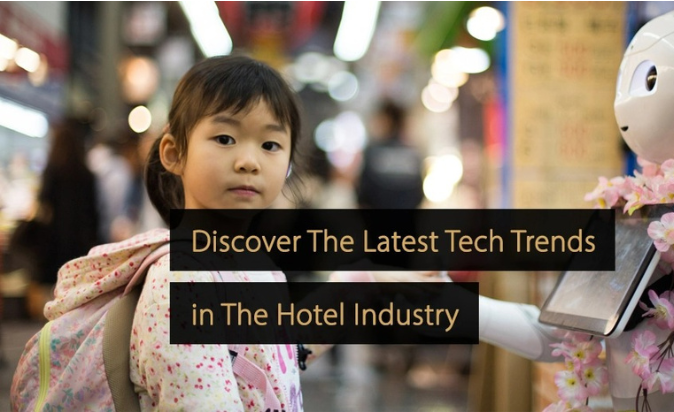Everything About Modern Hotel Technology
- Dec. 22, 2022
- FMCG HORECA BUSINESS

Modern hotels attract clients in a variety of ways, including the quality of customer service, the amenities provided, the style of the property, and hotel technology as well. This technology is often utilized to provide an exceptional customer experience, and it is crucial to do so in the age of COVID, when consumer expectations are changing fast and individuals must be persuaded that travel is worthwhile. This article describes the most recent advancements in hotel technology for 2023.
Why is hotel technology becoming more essential?
The concept of "business as usual" is rapidly shifting in the hotel sector. A few years ago, generic or "cookie-cutter" services may have sufficed. However, this is no longer the case. Guests increasingly expect hotels to provide more individualized services to match their specific needs. In addition, the growth of the internet community indicates that competition is intense. In order to keep loyal customers, hotels must use the tools and methods available to them. It is anticipated that the importance of hotel technology will only expand in the future years. Let's examine eleven intriguing and emerging hotel technology developments in the hospitality business.
Explore the General Hotel Technology Trends
This section provides an overview of the most recent hotel technology trends. Some innovations are the result of a shift in consumer behavior in response to the coronavirus pandemic, whilst other advances were hastened by a shift in consumer behavior.
1. Wireless Payments
Contactless payments are one of the most important innovations in hotel technology, since they expedite transactions. Previously, this was only possible with contactless cards. Nonetheless, the recent introduction of mobile wallets and wearables has widened this field, giving consumers alternatives even when they do not have their cards on them.
In the aftermath of the coronavirus outbreak, contactless payments have transformed from a convenience to a need. Many clients are unwilling to touch cash or input their PIN using a keypad, and utilizing contactless methods as much as possible will also assist to protect your personnel.
2. Hotel Robots
As a fast advancing technology, the usage of robots is one of the hotel industry's most exciting technological advancements. There are already instances of hotels using robots for tasks such as welcoming visitors upon arrival and delivering tourist information around the clock. Nonetheless, the applications now extend well beyond this.
Hotel robots have the ability to aid with housekeeping tasks, like as vacuuming floors and eradicating germs, which may be crucial for ensuring the COVID security of your facility. Nevertheless, some hotels also use robots for the transfer of baggage, security, room service, and restaurant waits.
It is also expected that this technology will continue to grow in the coming years, as robots become more dependable and better prepared to enhance their performance via artificial intelligence and machine learning.
3. Conversational robots
Chatbots and online widgets are commonplace on many websites and may be integral to a contemporary hotel's marketing plan. However, they are now also being implemented on Facebook Messenger and WhatsApp. The primary advantage here is the capacity to deliver prompt replies to consumer inquiries at all hours of the day.
Additionally, some chatbots may be programmed to interact in many languages, providing a more complete customer service experience. In the aftermath of COVID, the relevance of chatbots has also increased, since consumers often ask concerns regarding rules and processes, which can typically be handled successfully by bots.
4. Virtual Reality Hotel Tours
Virtual reality, or VR for short, is a technology that allows users to explore a digital world. It is particularly useful for people in hotel management, since it enables you to display a digital replica of your hotel for customers to explore from the comfort of their own homes.
VR is, in many respects, the best way to see a hotel before making a reservation, and many hotel websites are resorting to VR tours and 360-degree movies throughout the booking process to entice more customers. In light of COVID issues, virtual reality tours may be particularly effective in letting guests understand what to anticipate throughout their visit.
The majority of virtual reality tours may be seen in a conventional web browser on a computer, mobile device, or tablet, making it a technology that is broadly accessible to hotel guests. However, a specialized VR headset might improve the experience.
5. Mobile Check-In
Mobile check-in technology enables clients to check in using a mobile application. In this regard, it is comparable to contactless payments, since both are designed to eliminate friction for consumers. In addition, both of these hotel technology advancements may increase convenience and improve the client experience by decreasing waiting times.
Mobile check-ins enable hotels to eliminate predetermined check-in times for visitors, since the check-in procedure may be completed without human involvement. Because of this, it is also an excellent piece of hotel technology to showcase in COVID-related marketing activities.
6. Voice-Based Searches
The advent of home-based devices such as Alexa and Siri has shown that the mechanics behind simple voice searches have undergone a remarkable evolution in recent years. Not only are more thorough responses offered, but it is also considerably simpler to integrate these solutions with current hotel technology. In a world without hands, this makes a lot of sense. Guests may now make bookings or contact a hotel agent quickly using voice-enabled apps. This is quite useful when traveling. Undoubtedly, voice technology will replace more conventional solutions such as a static telephone number. In an age characterized in part by technological immediacy, it is only natural to include voice searches on this list.
7. Smart Hotels
It would seem that "smart" technology has become an integral part of our everyday life. Its significance has not diminished in the hotel industry. Automated check-out services, customized environmental settings in each room, the Internet of Things (IoT), and wireless data connection are already becoming standard. The ultimate objective is to provide visitors a totally personalized experience. This will serve to strengthen the hotel's brand identification, and as a consequence, guests will be more inclined to return in the future.
8. Service Management
The goal of self-service automation is to put the decision-making process in the hands of hotel visitors, as opposed to hotel workers. This is a direct result of patterns that have been seen in several industries. Self-service kiosks, online registration, targeted feedback surveys, and the possibility to pre-configure a room's amenities are now taking center stage. However, this does not mean that conventional employees have been eliminated from consideration. Their offerings are being complemented with a greater emphasis on internal automation.
9. Technology for Facial Recognition
Numerous customers are only starting to adapt to face recognition technology, especially in the context of smartphone security. Nonetheless, it is essential to note that these approaches also constitute an essential aspect of current hotel technology.











